The internet seems to be better at saying stop than it is at saying go. In this urgent overview of a decade of experiments in online organizing, Micah Sifry shows us what happened and lays out whats next.
SETH GODIN
No one better grasps the interplay between innovative media technology and politics than Micah Sifry.
KEVIN PHILLIPS
Now that communication can be quick as thought, why hasnt our ability to organize politicallyto establish gains and beyond that, to maintain themkept pace? The web has given us both capacity and speed: but progressive change seems to be something perpetually in the air, rarely manifesting, even more rarely staying with us.
Micah L. Sifry, a longtime analyst of democracy and its role on the net, examines what he calls The Big Disconnect. In plain speaking, he explores why data-driven politics and our digital overlords have failed or misled us, and how they can be made to serve us instead, in a real balance between citizens and state, independent of corporations.
 Author photograph by James Roderick
Author photograph by James Roderick
MICAH L. SIFRY is a writer, editor, and democracy activist. Co-founder and editorial director of Personal Democracy Media, he is the author or editor of six previous books, most recently WikiLeaks and the Age of Transparency .

2014 Micah L. Sifry
For all rights information: rights@orbooks.com
Published by OR Books, New York and London
Visit our website at www.orbooks.com
First printing 2014
All rights reserved. No part of this book may be reproduced or transmitted in any form or by any means, electronic or mechanical, including photocopy, recording, or any information storage retrieval system, without permission in writing from the publisher, except brief passages for review purposes.
Cataloging-in-Publication data is available from the Library of Congress.
A catalog record for this book is available from the British Library.
ISBN 978-1-939293-50-3 paperback
ISBN 978-1-939293-51-0 e-book
Typeset by Lapiz Digital, Chennai, India.
TABLE OF CONTENTS
This is a book for social and political activists .
FOREWORD
At the start, I want to define four key terms you will encounter in this book: the Internet, Big Data, Politics, and Democracy.
When I refer to the Internet, I first mean the set of protocols and practices that allow computing and communications devices to connect to each other and share information, and second the set of cultural behaviors and expectations that this underlying foundation makes possible. Those ideas and practices include open source software, open data, interoperability, linking, and transparency, as well as the fundamental freedom to connect. I do not think these are immutable principles that the technology of the network guarantees, but rather these are highly contested and endangered values that all kinds of powerful interests would love to contain or suppress.
The Internet as we have known it from its birth in the late 1960s to the present date is, simultaneously, an act of selfless coordination by many public-spirited engineers, a lucky accident, and a highly efficient way to solve the problem of connecting different computing and communications devices together. It is also in danger of being destroyed by a combination of greed (on the part of big tech companies who are walling it off), laziness (on the part of users who are choosing free and convenient services over a more decentralized and personally secure architecture), and nationalism (on the part of some countries that fear the freedom that the Internet makes possible and on the part of others that are using it maliciously to spy on and attack adversaries). The experience of being able to read, write, and connect freely to anyone else using the Internet is producing a momentous and precious shift in our culture towards greater self-awareness and voice on the part of individuals and groups. This is worth expanding and defending.
Next, what is Big Data? When I use this term, I mean the capacity to collect massive amounts of raw information for later processing at relatively low cost. Until a few years ago, it was quite expensive to amass large amounts of data and analyze it fast enough to derive significant value from it. When the cost of collection, processing, and analysis was prohibitive, people were forced to limit their data gathering. But the speed and capacity of computer chips have doubled every eighteen to twenty-four months, per Moores Law, driving costs to the floor. That fact, along with the rise of cloud computing and new processing platforms, has made past limits on big data obsolete. We can now observe and record nearly every human and digital interchange, meaning that more institutions (not just the National Security Agency) are collecting as much data as possible. And data analytics, the procedures and tools that we can use to derive meaning from raw data, are the new Holy Grail.
What about Politics? I believe that politics encompasses everything that we can and must do together . It includes how we educate our children, design our communities and neighborhoods, feed ourselves and dispose of our wastes, how we care for the sick and elderly and the poor, how we relate to the natural world, how we entertain and enlighten ourselves, how we defend ourselves and what values we seek to defend, what roles are chosen for us by virtue of our identity and what roles we create for ourselves. It is how we sort out, together, what kind of society we want, what kind of country we want, and what kind of world we want. Politics also means being able to askask as a community, not just as individuals isolated from each otherfundamental questions about where we are going and what the future should be for the generations that follow.
Finally, what is Democracy? Democracy is, simply, the system of government by which the people govern themselves. It is an aspiration that no one anywhere has yet achieved. As the Czech playwright Vaclav Havel told the U.S. Congress in February 1990, As long as people are people, democracy, in the full sense of the word, will always be no more than an ideal. One may approach it as one would the horizon in ways that may be better or worse, but it can never be fully attained. But the goal of democracy is the condition where all people can participate fully and equally in the decisions that affect their lives. That is my lodestar.
Havels words should haunt us:
Interests of all kinds: personal, selfish, state, national, group and, if you like, company interests still considerably outweigh
Lets do something about it.
Micah L. Sifry, March 2014
1
The Revolution That Wasnt
The Net, the very network itself, you see, is merely a means to an end. The end is to reverse-engineer government, to hack Politics down to its component parts and fix it.
Joshua Quittner, The Merry Pranksters Go to Washington, Wired Magazine , June 1994
I love the Internet.
I hate the Internet.
I love the Internet because anybody can connect to it, nobody owns it, and anyone can improve it. Its the ultimate proof that organized anarchism is not an oxymoron.
But more importantly, I love the Internet because it makes it easier to find the others, as Timothy Leary once said. This can save lives, foster community, and sometimes make us more powerful.

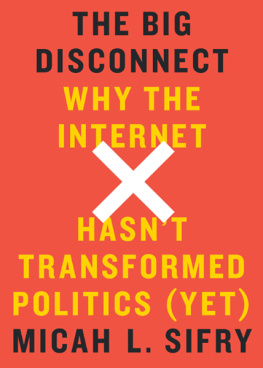
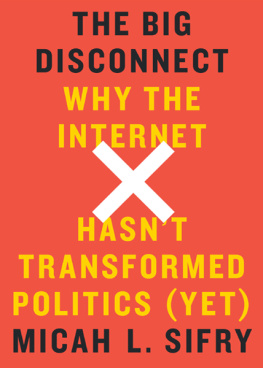
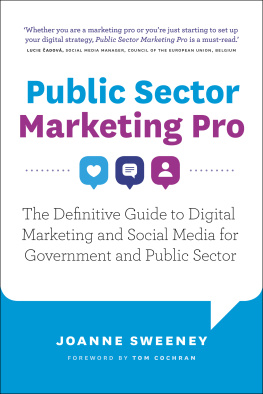


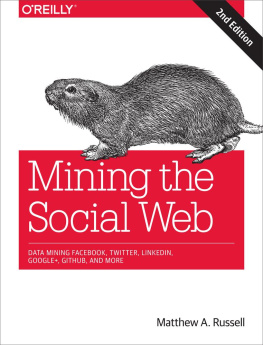
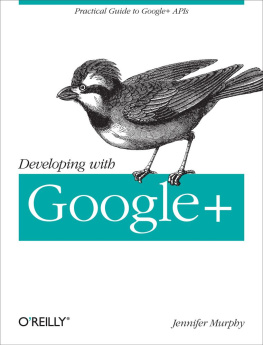
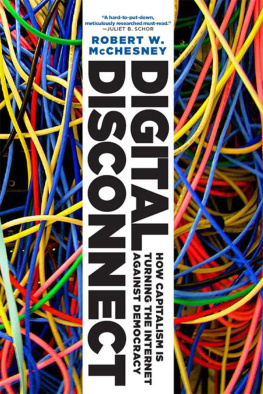
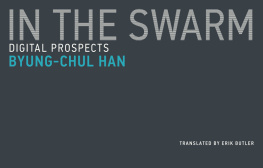

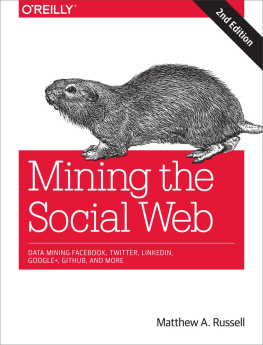
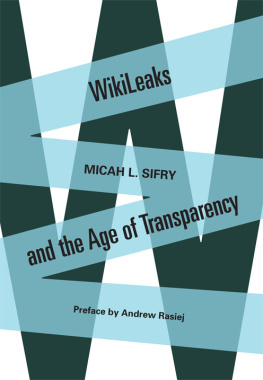

 Author photograph by James Roderick
Author photograph by James Roderick